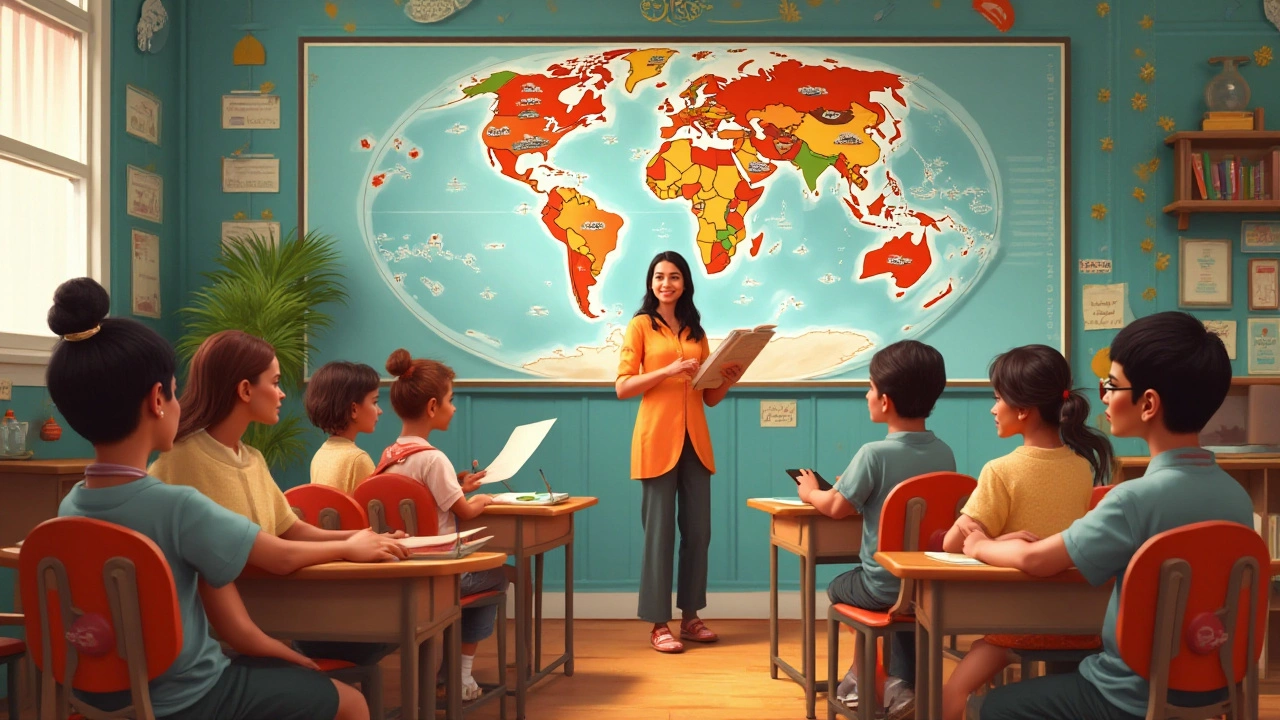The Central Board of Secondary Education, commonly known as CBSE, has been a prominent educational board in India for decades. What might surprise some is how far this Indian curriculum has traveled beyond its native land, marking its presence in various corners of the world. From the Middle East to East Africa, CBSE schools can be found catering to the educational needs of Indian expatriates as well as local students seeking quality education.
The journey of CBSE's international expansion began a few decades ago, with schools looking to offer a familiar curriculum to growing Indian communities abroad. Over time, the CBSE syllabus has become a viable choice for students seeking a structured education that is recognized globally. This curriculum not only prepares students for higher education but is also equipped to cater to diverse cultural settings.
- History and Expansion of CBSE Abroad
- Benefits of CBSE Syllabus Internationally
- Challenges Faced by CBSE Schools Outside India
- Future of CBSE in the Global Education Scene
History and Expansion of CBSE Abroad
The journey of the Central Board of Secondary Education, or CBSE, beyond Indian borders is a captivating tale of globalization and educational outreach. It all began in the late 20th century when the Indian diaspora started growing rapidly across the globe. Many Indian families, yearning for the same quality of education they left behind, sought institutions that mirrored what they'd known at home. Recognizing this demand, the first few CBSE schools started cropping up in the Gulf region during the early 1990s. These regions, which saw a significant influx of Indian workers due to robust oil economies, became perfect initial hosts for the CBSE curriculum.
As the demand for Indian education grew, so did the presence of CBSE across continents. Today, CBSE schools are not limited to just the Middle East—they span countries like Singapore, Malaysia, and even parts of Africa like Nigeria. This growth was not just a mere accident of geography; it was a testimony to the board's adaptability and commitment to quality education that transcends cultural and geographic boundaries. Surprisingly, local populations also started taking an interest in the CBSE syllabus, recognizing its well-rounded approach to academics and extracurricular development.
Interestingly, according to a report by the Ministry of Education in India, there are now over 200 CBSE-affiliated schools operating outside India. The board's policy of guiding through advisories and organizing regular principal conferences ensure that these international branches maintain consistent quality and adhere to the home syllabus's standards. This holistic strategy has solidified the trust that expatriate and local parents alike place in them for providing a stable, recognized form of education.
"CBSE continues to offer an education system that respects its heritage while embracing modernity," says Dr. Rajesh Singh, a leading educational consultant, referring to its worldwide expansion. "It's not just about providing an Indian education abroad but about blending the best of both worlds."
The strength of the CBSE curriculum is not merely in its adaptability. It also emphasizes analytical thinking, scientific rigour, and cultural history. These pillars have resonated with students worldwide because they offer a comprehensive approach that prepares students not just for exams but for life. The board's ability to evolve—through incorporating international perspectives alongside Indian educational standards—contributes to its growing global presence.
An interesting observation is the consistent rise in student numbers across these schools. Recent enrollment data suggests that many international CBSE schools have experienced a 15-20% increase in applications annually. For many families, particularly those frequently relocating due to work, having access to the same curriculum in different countries eases the educational transition. This is a significant consideration for families likely to move multiple times over the course of a child's education.
Benefits of CBSE Syllabus Internationally
When families move abroad, continuity in education becomes a priority. Here is where the CBSE curriculum shines. Offering an education model that mirrors what students are accustomed to back home in India, it proves invaluable for children adjusting to life in a new country. Not only does it ensure a seamless transition, but it also aligns perfectly with the educational aspirations many families hold. As a result, children are able to continue their education without feeling out of sync with their peers back home. This continuity fosters a sense of stability and comfort in their academic journey.
The structured nature of the CBSE syllabus is another point of attraction. It builds a strong foundation in subjects like Mathematics, Science, and English, which becomes instrumental for pursuing higher studies. The curriculum places a significant emphasis on conceptual clarity and practical knowledge. This makes students competitive in entrance exams globally. The internationally recognized board ensures that pupils are equipped with curricular knowledge that holds merit anywhere in the world.
"CBSE education promotes analytical thinking and problem-solving skills, which are crucial for academic success," states an educational consultant in the UAE.The syllabus, designed to be comprehensive and exhaustive, also often included projects and field trips to enhance students' understanding through real-world experiences.
Moreover, choosing the CBSE education system provides students with the advantage of using English as the medium of instruction, a critical skill in today's globalized world. English proficiency is vital in professional communication and is an asset that continues to hold value in international employment markets. Parents often find this aspect particularly appealing, knowing that their children are being prepared for English-language proficiency tests that are prerequisites for admission into reputed global universities.
Another engaging facet of the CBSE international framework is its ability to embrace technology in education. Many overseas CBSE schools employ modern teaching aids and smart classrooms, significantly enhancing the learning experience. With a tech-driven approach, teachers can personalize their instruction, addressing the individual needs of students. Such technological advancements clarify complex subjects, allowing students to learn according to their pace and style. Schools also often provide access to digital resources, such as online libraries and interactive platforms, contributing substantially to nurturing digital literacy among young learners.
Encouraging a balanced schedule of academics and extra-curricular activities, the CBSE system gives students opportunities beyond classroom learning. Participation in sports, arts, and community service are woven into the fabric of the curriculum, facilitating holistic development. This broad approach allows students to explore and cultivate diverse interests, making the schooling experience enriching and engaging. Parents favor such programs as they instill life skills and values crucial for future challenges. Thus, the CBSE curriculum abroad not only focuses on academic prowess but also strongly advocates for creating well-rounded, compassionate, and responsible individuals ready to step into the future.

Challenges Faced by CBSE Schools Outside India
Running a CBSE school outside India comes with its own unique set of challenges. These schools often cater to a diverse student body, which means the curriculum must be adapted to meet the cultural and educational expectations of students from various backgrounds. This can be a double-edged sword as the core curriculum remains standard, but nuances like teaching approaches and additional languages might need tweaking. Maintaining relevance while respecting the traditions from both the Indian system and the local community is always a delicate balancing act. Not all subjects might have the same resonance internationally, which can lead to a teacher trying to bridge these gaps creatively to engage students fully.
Another major challenge is the availability and retention of qualified teachers who are well-versed in the CBSE syllabus. Many educators trained in the CBSE framework prefer to stay within India due to comfort and familiarity with the environment. Schools often need to offer extra incentives to attract skilled teachers abroad. Moreover, geographical distance can result in a lack of direct support and resources from the main CBSE organization, which means international schools may have to be more self-reliant, a fact echoed by many teachers working at these schools. Technical support, real-time updates, and professional development can often lag, leaving educators to improvise and innovate on their own.
Administrative hurdles are also present. Licensing and accreditation requirements can differ vastly depending on the country. Bureaucratic red tape might inhibit a school’s ability to operate smoothly, causing delays in implementing crucial changes or improvements. Compliance with local educational standards without compromising on the CBSE ethos further complicates the situation. In some regions, political factors might come into play, as educational standards are keenly monitored by local governments who might have agendas differing from those of the educational institution in question.
Another critical challenge is community engagement. While there may be a significant Indian expatriate community that demands a familiar educational system, reaching out to the local populace and proving the value of a CBSE education can be daunting. This often involves marketing the school's benefits beyond the theoretical aspects and showing tangible success through alumni achievements. Engaging with parents and local community leaders might require schools to host events that highlight how CBSE education positively impacts holistic development in students. This could lead to expanded open days, cultural fairs, or even information sessions designed to bridge knowledge gaps between the Indian and foreign educational communities.
Lastly, logistical issues such as textbook procurement and exam administration can pose significant hurdles. Importing textbooks is expensive, and the customs process can result in delays that impact the academic schedule. Schools might resort to e-books or online materials, which require additional IT infrastructure not all institutions have in place. Similarly, administering exams as per CBSE guidelines necessitates a secure, monitored environment which can be challenging to implement in an international setup.
Future of CBSE in the Global Education Scene
Looking ahead, the CBSE curriculum is poised for a significant role in the ever-evolving global education landscape. The board's adaptability and structured approach make it a favorite choice for international students craving consistency and rigor in their studies. But what really sets the stage for CBSE's promising future is its continuous reform efforts, focusing heavily on integrating technology and digital learning methods. As the world leans more towards digital literacy, CBSE's anticipation of this shift ensures students are not just book-smart but also tech-savvy. This anticipated change could potentially make CBSE schools the sought-after choice for expatriate communities worldwide, as well as local populations looking for cutting-edge education systems.
The drive for educational innovation doesn't stop at digital tools. There's a strong emphasis on holistic development, which means that students under the CBSE system abroad can expect more than just academic instruction. As it adapts to address global education trends, CBSE's curriculum increasingly values skills like cultural intelligence, emotional learning, and problem-solving aptitudes. These aspects have started drawing a variety of schools outside India, pushing CBSE into new territories which traditionally followed Western education models. Importantly, parents also see value in a more global-minded academic route, one that opens multiple doors—be it in higher education or future career paths.
There is an inspiring community of educators who support these shifts, regularly updating their methods and resources for better student engagement. A notable trend is the participation of CBSE schools in global competitions and conferences, which points to an exchange of innovative ideas and collaborative ventures. Presently, there are indications of potential strategic partnerships between CBSE and established international boards. This could spell even broader recognition and credential alignment, which fundamentally influences the transferability and utility of education for students across borders. As such, the future of CBSE lies in embracing partnerships and experimental educational methodologies, enabling it to remain relevant and ahead in an increasingly interconnected world.
Sir Ken Robinson once stated, "The fact is that when kids leave school they’re not finished products; they’re people in transition." This quote resonates deeply with CBSE's mission to prepare students not just for exams, but for life.
Given its strong network and growing acceptance across continents, CBSE is on the cusp of broader international influence. The steps taken today to inject futuristic changes will decide not only the scope but also the permanence of CBSE's foothold globally. Tracking its integration into diverse cultural settings will provide valuable insights into the strategies used to sustain this progression. The emerging trend of blending traditional Indian educational values with global best practices suggests a thriving frontier where students can benefit from a more comprehensive and inclusive learning experience.





